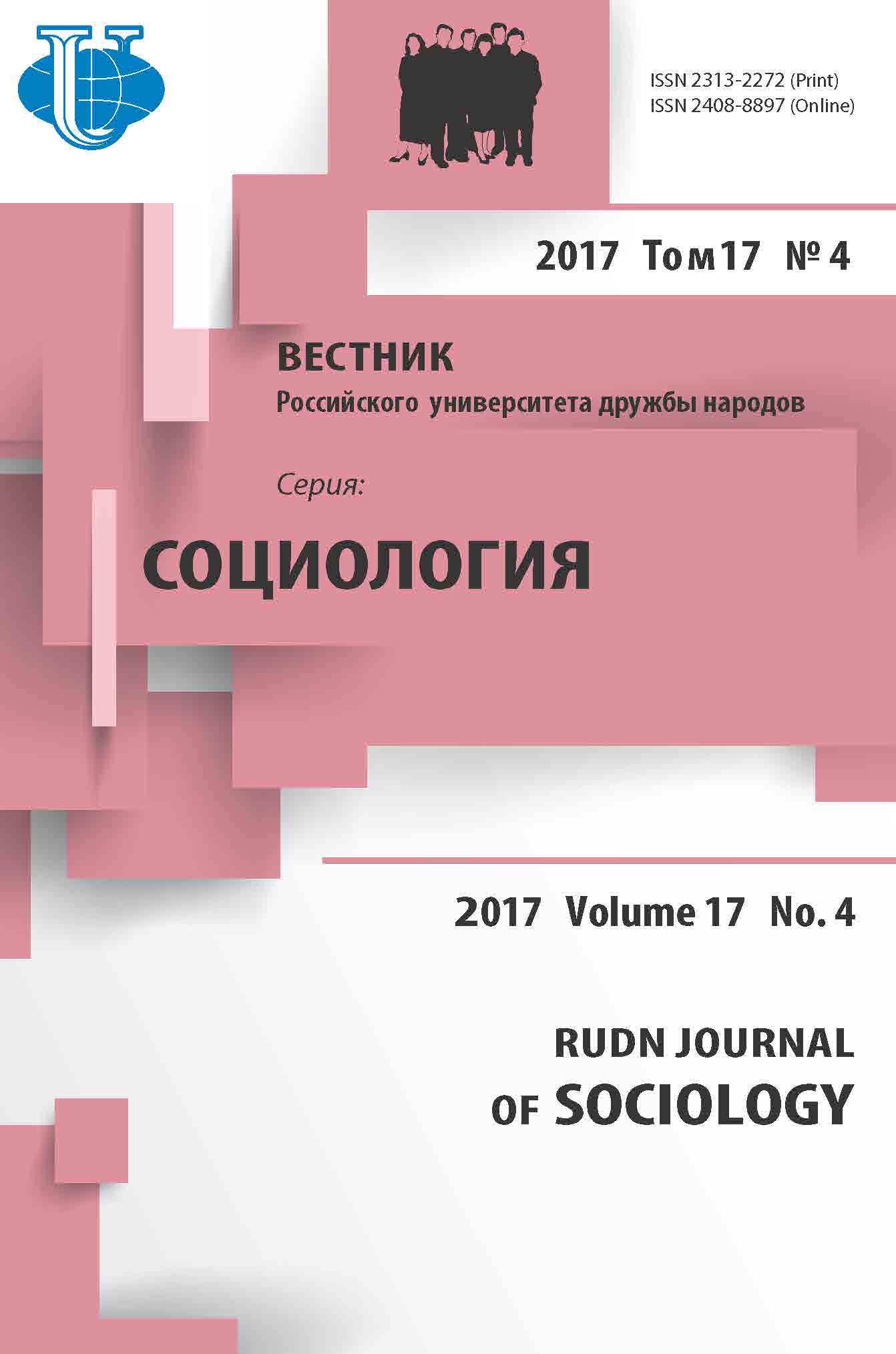CHALLENGES FOR TODAY’S RUSSIAN POLITICAL ELITE, AND WAYS TO ADDRESS THEM
- Authors: Sharkov FI1, Ponedelkov AV2, Vorontsov SA2
-
Affiliations:
- Russian Presidential Academy of National Economy and Public Administration
- South-Russian Institute of management - branch of RANEPA
- Issue: Vol 17, No 4 (2017)
- Pages: 524-541
- Section: Surveys, experiments, case studies
- URL: https://journals.rudn.ru/sociology/article/view/17294
- DOI: https://doi.org/10.22363/2313-2272-2017-17-4-524-541
- ID: 17294
Cite item
Full Text
Abstract
The authors aimed to conduct a study of the current state and prospects for the development of elitology in Russia, and to identify the public perception of political leaders, which is necessary for federal and regional elites and for improving the efficiency of the state personnel policy, mechanisms for interaction of elites in the social-political space and, thus, for increasing the transparency of power. The authors rely on the political, historical-legal, formal-legal, and structural-functional analytical approaches. Based on the results of the panel expert surveys conducted during the First All-Russian Elitological Congress “Elitology of Russia: The Current State and Prospects for the Development” (2013, Rostov-on-Don) and the Second All-Russian Elitological Congress “Elitology and Strategies for the Development of Contemporary Russia” (2016, Rostov-on-Don), the authors reconstruct the general perception of Russian elites by the expert com-munity, and the dynamics of changes in the elite group; identify the public estimates of today’s regional political elites, and a discrepancy between elitism in the traditional sense and the real political power. The comparison of the results of the panel surveys conducted in 2013 and 2016 allowed to combine the findings in the groups: general perception of the Russian elites and the reliability of information about them; estimates of the dynamics of qualitative changes in the elites; measures to promote the development of inter-elite interaction and leadership. The authors made the following conclusions: both public and expert opinions underestimate the elite capital of the ruling groups; there are system symptoms of oligarchization of the elites that tend to use non-democratic means of holding power; there is an obvious task of changing the approaches to assessing and recruiting elites in the current social-political situation in Russia; in 2017, the Russian society is at the crossroads, and the choice of the direction for further development is com-plicated by the destructive impact of the aggressive global elites pursuing their own interests that con-tradict Russia’s national interests.
About the authors
F I Sharkov
Russian Presidential Academy of National Economy and Public Administration
Author for correspondence.
Email: sharkov_felix@mail.ru
Prosp. Vernadskogo, 84, Moscow, 119606, Russia
A V Ponedelkov
South-Russian Institute of management - branch of RANEPA
Email: ponedelkov@uriu.ranepa.ru
Pushkinskaya St., 70/54, Rostov-on-Don, 344002, Russia
S A Vorontsov
South-Russian Institute of management - branch of RANEPA
Email: raven_serg@mail.ru
Pushkinskaya St., 70/54, Rostov-on-Don, 344002, Russia
References
- V Pentagone nazvali Rossiyu samoi moshchnoi iz ugrozhayushchikh Vashingtonu stran [The Pentagon called Russia the most powerful country threatening Washington]. TASS. 2017, July 23. http://tass.ru/mezhdunarodnaya-panorama/4433311 (In Russ.).
- Zayavlenie Londona o prave na yadernyi udar osudili v Sovete Federatsii [London’s statement on the right to nuclear strike was condemned by the Federation Council]. https://eadaily.com/ ru/news/2017/04/25/zayavlenie-londona-o-prave-na-yadernyy-udar-osudili-v-sovete-federacii (In Russ.).
- Zlobin A. «Nikto by ne perezhil»: Putin nazval pobeditelya v yadernoi voine Rossii i SShA [“No one would have survived”: Putin named the winner in the nuclear war between Russia and the United States]. http://www.forbes.ru/biznes/345747-nikto-ne-perezhil-putin-nazvalpobeditelya-v-yadernoy-voyne-rossii-i-ssha (In Russ.).
- Obama nazval tri glavnye ugrozy miru: virus Ebola, Rossiya i dzhikhadisty [Obama named three major threats to the world: the Ebola virus, Russia and the jihadists]. Novyi den. 2014, Semptember 25. https://newdaynews.ru/policy/512978.html (In Russ.).
- Ponedelkov A.V., Samygin S.I., Starostin A.M., Vereshchagina A.V. Osnovy politologii [Principles of Political Science]. Rostov-na-Donu: Feniks; 2012 (In Russ.).
- Ponedelkov A.V., Starostin A.M. Elity: gipotezy i fakty. Elitologiya i strategii razvitiya sovremennoi Rossii [Elites: Hypotheses and Facts. Elite Studies and Strategies of Development for Today’s Russia]. Materialy Vtorogo Vserossiiskogo elitologicheskogo kongressa s mezhdunarodnym uchastiem 21—22 oktyabrya 2016 g. Ed.: Shutov A.Y. Rostov-na-Donu: Izd-vo YuRIU RANKhiGS, 2016 (In Russ.).
- Solzhenitsyn A.I. Raskolotyi mir. Vystuplenie na assamblee vypusknikov Garvardskogo universiteta [Divided world. Speech at the Assembly of graduates of Harvard University]. New Jersey. 2008. www.stnicholasredbank.com.
- Fakhrutdinov R. Tramp uvidel v Rossii ugrozu [Trump saw Russia as a threat]. https://www.gazeta.ru/politics/2017/05/25_a_10692725.shtml (In Russ.).
- Habermas J. Strukturnoe izmenenie publichnoi sfery. Issledovanija otnositel'no kategorii burzhuaznogo obshchestva [The Structural Transformation of the Public Sphere: An Inquiry into a Category of Bourgeois Society]. Moscow: Ves' mir; 2016 (In Russ.).
- Chugrov S.V. Transformatsiya obshchestvennogo mneniya v epokhu global'noi nestabil'nosti [Transformation of public opinion in the era of global instability]. Kommunikologiya. 2017; 5(4) (In Russ.).
- Sharkov F.I. Konvergentsiya elementov politicheskogo mediaprostranstva [Convergence of political media space elements]. Politicheskie issledovaniya. 2017; 3 (In Russ.).
- Shutov A.Y., Lakota O.V., Eremeev S.G. et al. (eds.). Elitologiya i strategii razvitiya sovremennoi Rossii [Elitology and Strategies for the Development of Contemporary Russia]. Materialy Vtorogo Vserossiiskogo elitologicheskogo kongressa s mezhdunarodnym uchastiem 21—22 oktyabrya 2016 g. Vol. 1. Rostov-na-Donu: Izd-vo YuRIU RANKhiGS, 2016 (In Russ.).
- Shutov A.Y., Lakota O.V., Eremeev S.G. at al. (Eds.). Elitologiya i strategii razvitiya sovremennoi Rossii [Elitology and Strategies for the Development of Contemporary Russia]. Materialy Vtorogo Vserossiiskogo elitologicheskogo kongressa s mezhdunarodnym uchastiem 21—22 oktyabrya 2016 g. Vol. 2. Rostov-na-Donu: Izd-vo YuRIU RANKhiGS, 2016 (In Russ.).
- Elitologiya Rossii: sovremennoe sostoyanie i perspektivy razvitiya [Elitology of Russia: The Current State and Prospects for the Development]. Materialy Pervogo Vserossiiskogo elitologicheskogo kongressa s mezhdunarodnym uchastiem, 7—8 oktyabrya 2013 g. Vol. 1. Rostovna-Donu: Izd-vo YuRIU RANKhiGS, 2013 (In Russ.).
- Narbut N.P., Trotsuk I.V. Neighboring countries’ images: Persistent stereotypes of the Russian student youth. RUDN Journal of Sociology. 2017; 17(3).
- Šuvaković U.V., Narbut N.P., Trotsuk I.V. The youth of Russia and Serbia: Social trust and key generational problems. RUDN Journal of Sociology. 2016; 16(4).
Supplementary files













